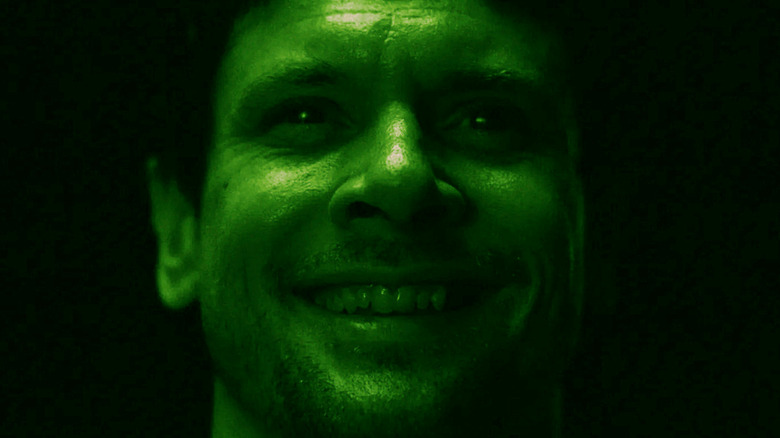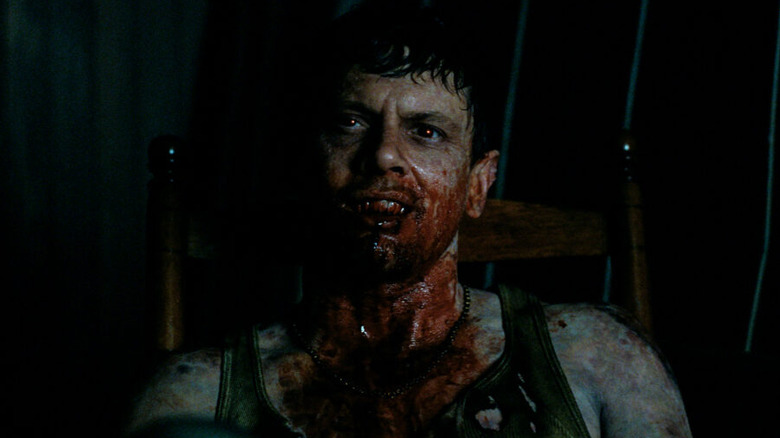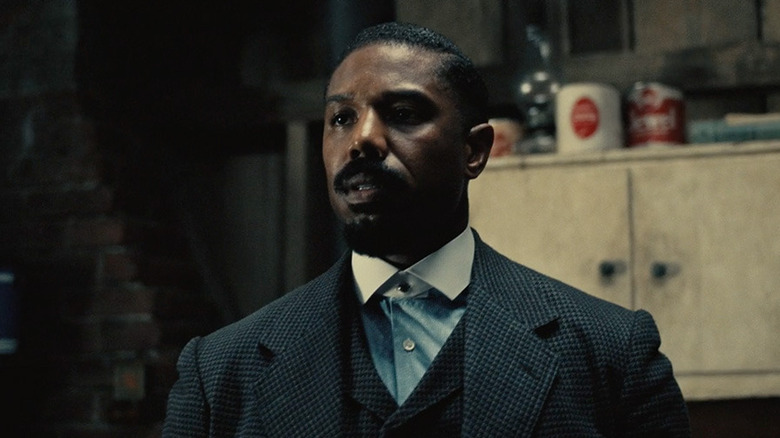Horror Hit Sinners Offers A Bracing Examination Of Irish-American History
Spoilers ahead for "Sinners."
2025 hasn't even hit blockbuster or Oscar season yet, but Ryan Coogler's "Sinners" is already looking like the movie of the year. It's a remarkable film, and rave reviews plus a remarkable box office performance indicate most would agree with me.
Set in the Mississippi Delta town of Clarksdale in 1932, "Sinners" follows Black twins Elijah "Smoke" and Elias "Stack" Moore (Michael B. Jordan as both), who are known collectively and notoriously as the "Smokestack Twins." Having made a small fortune working for (and then robbing) gangsters in Chicago, the twins are opening their own juke joint in an attempt to carve out a little slice of Heaven for the local Black community. Their guitar-playing cousin Sammie (Miles Caton), the son of a devout preacher, helps draw in the crowds with his preternatural music skills. But the night turns into Hell when Sammie's spectacular strumming catches the ear of some wandering vampires, led by Remmick (Jack O'Connell).
Remmick affects a Southern American accent, but he's actually an Irishman and lets his true brogue slip a few times — like the scene where he leads his new thralls in a chorus of "The Rocky Road to Dublin." As "Sinners" shows, the Ku Klux Klan besieged the Black people of 1930s Mississippi. It would've been an easy creative choice to make those people the film's vampire villains — so why is an Irish outsider the leader instead?
The modern vampire has Irish roots; Bram Stoker, author of "Dracula," was an Irishman. "Dracula" has been widely interpreted as a story about the fear of foreign invasion, and in "Sinners" that invader comes from the same land Stoker did. Both Coogler and O'Connell have also spoken about their love for Irish culture and music on the "Sinners" press tour. (O'Connell is English, but his father was from Ireland, and he learned traditional Irish dancing as a kid — skills he gets to show off in the film.)
"My understanding [is that Ireland's] biggest export is people," said O'Connell to GQ. "Just to understand the influence that had on the American south at this particular time, and how that found its way into the music there, was something I know that Ryan's savvy to, and I think part of the reason for Remmick being from Ireland."
"I'm obsessed with Irish folk music, my kids are obsessed with it, [and] my first name is Irish," Coogler himself explained in an interview with Indiewire. "I think it's not known how much crossover there is between African American culture and Irish culture, and how much that stuff is loved in our community."
Indeed, African Americans and Irish-Americans are communities that started at similar points but took two different paths. "Sinners" distils those intersecting histories into a pressure-cooker horror tale.
Remmick mirrors the complicated history of Irish Americans
Nowadays, Irish-Americans are accepted as white and have all the privilege that entails. But when Irish immigrants first came to America in the 18th and 19th centuries, things were different. They were looked down on and confined to lower socioeconomic status. The Irish carried with them the stigma of British colonization and Catholicism, and of course they were more competition for resources and employment among multi-generational Americans. The "Know Nothings" in the mid-19th century were a nativist party brought together by paranoia over Catholic "subversion" of America.
Now, the conditions early Irish-Americans faced are not one-to-one with what African Americans face. Unlike Black people, the Irish were never systematically and racially enslaved as chattel in America. And of course, unlike Black people (who continue to face racism today), the Irish assimilated into white America, gaining demographic-wide political power. Some Irish-Americans locked arms with other white groups to look down on communities still facing marginalization, including Chinese immigrants and African Americans. Those are also two groups targeted by Remmick in "Sinners."
"Sinners" creates a link between Irish people and African Americans from the very beginning. The opening narration describes the two groups as sharing common myths about musicians so skilled they could bridge the past and present. In "Sinners," music is literally magic, the stories told in lyrics being the living history of communities. Sammie's music can tap into that magic, but Remmick's can't. As a vampire, he's lost his connection to his roots — a symbol of Irish assimilation. That assimilation is the reason that, even today, many Irish-Americans champion Irish unification yet have little real understanding of the struggle for it.
Blues musician Delta Slim (Delroy Lindo) tells Sammie that folk music is the true culture of African Americans, not the Christianity that was forced on them. Note that the church where Sammie's father preaches is painted white. Here, too, "Sinners" finds commonality between Black people and the Irish. Remmick is apparently old enough to remember the time of Celtic paganism. He confides in Sammie (as he fearfully prays "Our Father") that the men who "stole his father's land" are the same ones that taught him that prayer.
Remember as well how the first two people we see Remmick turn are white people (and KKK members): Joan (Lola Kirke) and Bert (Peter Dreimanis). That's who Remmick welcomes into to his flock first. And yet, he claims, he isn't targeting the Moores and their community out of hatred, but love.
Sinners uses vampires to represent cultural assimilation
The vampires of "Sinners" aren't sexy in an Anne Rice sense. No one will confuse the beastly Remmick for Lestat de Lioncourt. Instead, they present a different kind of seduction and allure: the promise of freedom, equality, and community. These are the lies of America that have lured the huddled masses to the nation's shore. The human world has already left the Black people of Clarksdale for dead, Remmick claims, so they should let themselves be reborn into his kingdom.
Another central point in "Sinners" is Black capitalism and ownership: the idea that Black people can find freedom in spaces they build for themselves. In "Sinners," this is an almost impossible dream. Smoke warns Sammie that "Chicago is Mississippi with tall buildings instead of plantations," because racism is everywhere, not just in Klan-patrolled sharecropping communities.
The twins' juke joint was doomed even without the vampires. Their Black customers don't have the wealth to support the joint, many of them paying for their drinks with plantation tokens. And Hogwood (David Maldonado), the man who sells them the sawmill and its land, is secretly the Grand Dragon of the Ku Klux Klan and intends to slaughter the Smokestack Twins and their patrons after opening night. This compares to the 1921 Black Wall Street massacre, when white supremacists — fearful of a thriving, Black-owned community in Tulsa, Oklahoma — razed the town and its people to the ground.
The vampires share a hive mind, so no differences or prejudices exist among them. When the recently-turned Stack reaffirms Remmick's words that only undeath will break their chains, Smoke is entranced for a moment and walks towards him. But Smoke catches himself. "Sinners" argues that assimilation is not liberation, because assimilation requires sacrifice of uniqueness. The freedom that Remmick offers demands the predation of others, too, just as white supremacy does.
Stack tells his twin that the KKK intended the Juke Joint to be a slaughterhouse, but that's ultimately what Remmick makes it into as well. Different goals, same results. By the end of "Sinners," Sammie submits neither to vampirism nor Christianity. He resists the "sweet pain of death" as offered by both Remmick's ravenous face and Stack's reassuring one. Sammie keeps singing his own songs and in doing so he forges his life as one link in the chain of Black history.
"Sinners" is playing in theaters now.


